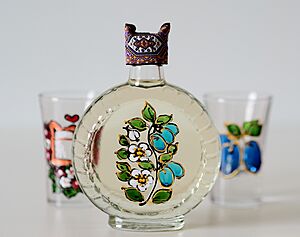Slivovitz facts for kids
Slivovitz, slivovitza, slivovitsa, șliboviță, šljivovica, śliwowica, Schlivowitz, slivovice, slivovica or slivovka is a fruit spirit (or fruit brandy) made from damson plums, often referred to as plum spirit (or plum brandy). Slivovitz is produced in Central, Eastern and Southern Europe, both commercially and privately. Primary producers include Bosnia and Herzegovina, Bulgaria, Croatia, Czech Republic, Greece, Hungary, Italy, North Macedonia, Poland, Romania, Serbia, Slovakia, Slovenia, and Ukraine. In the Balkans, slivovitz is considered a kind of rakia. In Central Europe it is considered a kind of pálinka (Austria, Czech Republic, Hungary, Poland, Slovakia, Ukraine—pálenka, or Greece, Romania and Italy-pălincă), and similar to Romanian țuică, corresponding to the distilled spirits category.
Etymology
The word slivovitz derives from Proto-Slavic *sliva "plum" (Bulgarian: слива, Czech: švestka or slíva, Polish: śliwka, Serbo-Croatian: šljiva/шљива, or Slovak: slivka) with the diminutive suffix *-ica (/-ɪtsa/; -ice in Czech). Distilled spirits from different fruits are named similarly. For example, Czech meruňka apricot → meruňkovice apricot spirit; broskev peach → broskvovice peach spirit.
Production and consumption
The primary producers are Bosnia, Bulgaria, Croatia, Czech Republic, Hungary, Poland, Romania, Serbia, and Slovakia.
Regional names
Following the claims of several nations to the protected designation of origin, in October 2007 the European Union went for a compromise solution, leaving "slivovitz" as a generic name, and granting individual nations the right to protect the origin with their own adjective.
In respective languages, slivovitz (/ˈslɪvəvɪts/) is known as: Bulgarian: сливова, сливовица; Czech: slivovice; Dutch: Slivovits,German: Sliwowitz, Slibowitz; Hungarian: sligovica; Italian: slivovitz; Macedonian: сливова; Polish: śliwowica; Romanian: şliboviţă; Russian: сливовица; Croatian: šljivovica; Serbian: шљивовица; Slovak: slivovica; Slovene: slivovka; Ukrainian: слив'янка; and Yiddish: שליוואָוויץ.
Identical or similar spirits are also produced in Austria, Canada, France, Germany, Switzerland, the United States, and regional names include generic plum spirit, Pflümli, or eau-de-vie de quetsche.
Distilling process
Only Damson plums may be used as the base fruit for distillation. Before the production process, the plums may be slightly pressed or otherwise disrupted to speed up the fermentation process, but without damaging their ground kernels; yeast, starch, and sugar may be added to the juice. The mixture is then allowed to ferment. There may be one or more distillation stages, depending on the desired final product or region of production, and aging is common to enhance the distillate's finer flavours.
Some producers have obtained a Hechsher certifying that it is kosher for Passover, and thus suitable for consumption during the festival when grain-based liquors are forbidden.
Some modern production techniques, such as those used by Clear Creek in Oregon, omit the use of the pits in fermentation to create a less acerbic or bitter taste.
Imitation slivovitz is made by flavouring spirits with prune juice and artificial oil of bitter almonds.
See also
 In Spanish: Slivovitz para niños
In Spanish: Slivovitz para niños


